VOOPOO VMATE E2

4.5
Outstanding
PROS
- Small and compact for what it offers
- Double-sided leather is a premium touch
- Dust cap helps keep things sanitary
- User-friendly; automatically adjusts wattage for the pod
- Good for vaping freebase and nicotine salt ejuices
- Can be used for RDL to tight MTL vaping out of the box
- Clear battery percentage readout
- 3X Upgraded pods last long, are leak-free, and produce excellent flavor
- Great battery life from 1500mAh battery (2+ days)
- Recharges in only 45 minutes (2A charging)
CONS
- Tint makes it difficult to see into pods
- Dust cap doesn't attach to bottom of device; can be easily misplaced
- Spec wise, not too different from VMATE i2
The bottom line
The VMATE E2 brings upgrades to the VMATE E in all of the right ways. The design has been greatly improved to feel even more luxurious and premium. I really like the new magnetic dust cap because it helps keep things sanitary and fluff-free. The larger battery, fast charging, and increased 30W maximum output are all welcome upgrades too.
After reading this review, you might be wondering what the difference is between the VMATE i2 and the VMATE E2. Put simply, not a lot. The VMATE E2 is a more premium device with better materials, a battery life display, and 2A charging.
The VMATE i2 is thinner and more pocket-friendly. All of the other specs are the same, as is the performance, so which one you get really depends on if you value the battery life indicator and quicker charging, or if you want a slightly more portable device. If it were up to me, I would go with the VMATE E2 but you can’t go wrong with either.
SAVE 12%
CODE: VERSED
The VMATE E2 is the version two of the VMATE E which was released in 2022. It’s the latest addition to VOOPOO’s large family of VMATE products, all of which use VMATE Cartridges. These devices include the VMATE i2, VMATE PRO, VMATE MAX, and VMATE E.
The VMATE E2 is one of the most user-friendly pod devices of the bunch. There is very little to adjust, which makes it ideal for beginner vapers. Depending on which pod you are using, the VMATE E2 automatically adjusts the wattage up to 30W. There is an airflow control slider to fine-tune the draw but that’s the extent of the adjustability with this device.
Compared to the VMATE E, there are a few notable upgrades, including a double-sided leather design and an improved magnetic dust cap to keep lint and dust out of the mouthpiece when you put it in your pocket. It also has a larger 1500mAh battery for extended usage and features 2A fast charging.
The VMATE E2 comes with two of VOOPOO’s “3X Upgraded” Top Fill cartridges which are said by VOOPOO to provide long-lasting pure taste, a 90-day coil lifespan, and 30 days of leak-free use.
- 1 x VOOPOO VMATE E2 Device
- 1 x VMATE Top Fill Cartridge 0.7Ω (3ml)
- 1 x VMATE Top Fill Cartridge 0.4Ω (3ml)
- 1 x Type-C Cable
- 1 x User Manual
- Size: 95mm x 33.5mm x 19mm
- Weight: 92g
- Pod Capacity: 3ml
- Draw activated
- RDL/MTL/Tight MTL draw
- Battery Capacity: 1500mAh
- Charging: 2A Type-C
- Output: 5-30W
- Airflow adjustment
Design & Build Quality
The VMATE E2 is the epitome of premium design. It takes the one-sided leather design of the original VMATE E a step further with double-sided leather which covers the front and back of the device. The leather really ups the look of the device and gives it a refined and elegant appearance. It also adds good grip and feels nice in the hand.
This leather also extends on to the magnetic dust cap. This removable cap protects the mouthpiece from dust and lint and helps to keep things sanitary, which I really like. The magnets are very strong and easily attach to the device. This is an improvement over the snap-on mouthpiece that the VMATE E used and the magnets just make the dust cap that much more convenient.
The sides of the dust cap and device are made of high-quality zinc-alloy. Depending on the color that you get, the frame will have either a shiny or matte finish. Both finishes hold up well to wear and tear and have proven to be durable during my testing.
My only issue with the dust cap is that there’s nowhere to put it when it’s removed. It doesn’t attach to the device and so it can be easy to misplace. The best practice is to just hold it in your hand and replace it onto the device when you’re done vaping but I would have liked to see it attach to the bottom of the device in some way.
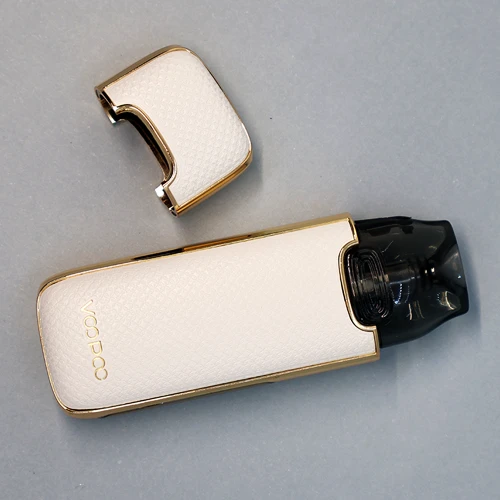
For all that it offers, the VMATE E2 is reasonably small and compact. It’s even shorter than the original at 95mm in height, although slightly larger in width and depth at 33.5mm and 19mm respectively. With a weight of 92g it has some heft to it but it’s overall a comfortable size and weight for daily use.
The only adjustable feature on this device is the airflow, with the slider located on the front. It can be set for restricted direct lung, mouth to lung, and even tight mouth to lung vaping depending on the pod that you use. The slider has a bit of resistance in order to keep it in place but it’s easy to adjust when you actually want to move it.
The display on the side is similar to the one on the VMATE i2 but better. It’s an RGB light bar that indicates your battery level but with the added bonus of a battery percentage readout at the top.
On the bottom of the VMATE E2 there is a Type-C charging port. This means that you have to lay the device down to charge but that hasn’t given me any issues with leaking.
As far as version two devices go, the design of the VMATE E2 keeps with the original but just makes everything a bit better. Double sided leather instead of single sided leather, a magnetic dust cap instead of a snap-on one, and a screen display for battery life. It still looks like the VMATE E, it’s just nicer and upgraded in all of the right places.
Pods
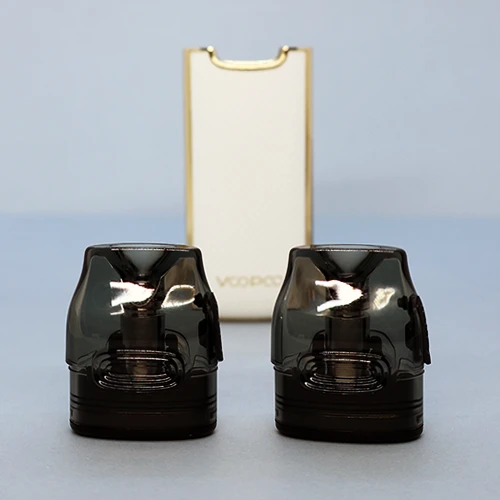
Although at first glance the pods for the VMATE E2 might look the same as the ones for the VMATE E, they’re actually not. These are VOOPOO’s “3X Upgraded” Top Fill cartridges which can be filled without removing them from the device. They’re still compatible with older VMATE devices and the older VMATE cartridges are compatible with the VMATE E2, but these cartridges are just better – believe me, I know from experience.
Why are they better though? Compared to the original VMATE cartridges, these 3X upgraded ones have better lifespan, better leak resistance, and produce better flavor. VOOPOO says that these cartridges can go through up to 90ml of eliquid, last for 30 days without leakage, and consistently bring rich flavor. I won’t spoil the “Performance” section of this review just yet, but I will say that they are very good.
Two pods come included with the VMATE E2: a 0.7Ω VMATE Top Fill Cartridge and a 0.4Ω VMATE Top Fill Cartridge. Both can hold up to 3ml of ejuice and both can be used for RDL to MTL vaping, although the 0.4Ω pod is better for RDL and freebase ejuices while the 0.7Ω pod is better for MTL and nicotine salt ejuices. There’s some crossover for sure but this is how I recommend using them.
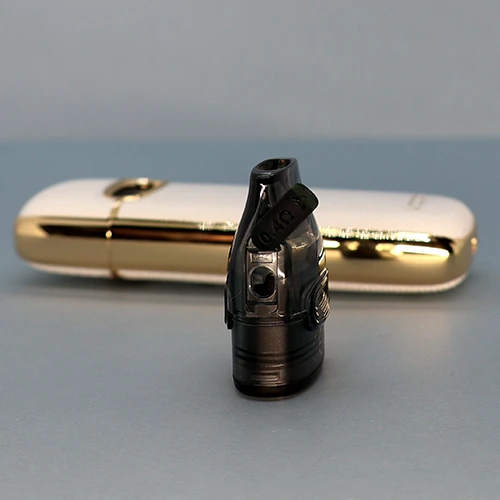
As previously mentioned, the fill port is located just above where the pod sits in the VMATE E2 so the pod can be filled without removing it from the device. It’s as easy as removing the rubber stopper and inserting your ejuice bottle nozzle.
The pods are tinted ever so slightly, so it’s difficult to see into the pod without a light source. Minor issue but it’s an annoying one. I understand why VOOPOO did this though and it’s in order to preserve the ejuice by restricting the amount of light that gets into the pod. I guess the difficulty in seeing the ejuice inside of the pod is the trade-off for fresher-tasting vapor.
The pods pressure-fit into the device, along with a slightly magnetic connection. The pressure-fitting is what really keeps the pods secure so just make sure to fully seat the pods by listening out for a ‘click’.
When the pod is seated in the device you can still see the entire pod (provided you hold up a light source). This is nice because you don’t have to remove the pod to check on your ejuice level.
Features

The design of the VMATE E2 has clearly received some upgrades but what about the specs and features? Yes and yes. While the E2 is not as feature-rich as the VMATE MAX or VMATE PRO due to its lack of adjustable wattage, it has still been improved over the original. It has a higher maximum wattage output of 30W, up from 20W, and an RGB lighting bar and battery life display instead of a 4 LED readout. The battery capacity has also been increased from 1200mAh to 1500mAh.
The RGB light bar is nice but unlike the VMATE i2 which used this light bar to relay all of its battery information, the VMATE E2 has a battery percentage readout. This makes the RGB light bar unimportant for battery life purposes but it still adds a nice look to the design.
It still serves some function such as flashing red when the pod isn’t detected, flashing red twice when a short circuit is detected, and changing from flowing to solid when charging and fully charged. There are other ways the light functions in regards to other errors but I won’t bore you with those details; they can all be found in the user manual for the E2.
Battery life and Charging

The 1500mAh battery inside of the VMATE E2 is a nice upgrade over the previous generation. It lasts a long time too, with myself getting at least 3 days of use between charges. I vape quite heavily so 3 days is probably quite conservative too.
The charging speed on the E2 is rated as 2A so charging is very, very quick. Plugged into a wall charger with a good cable and block, it only takes 45 minutes for a full charge.
Performance
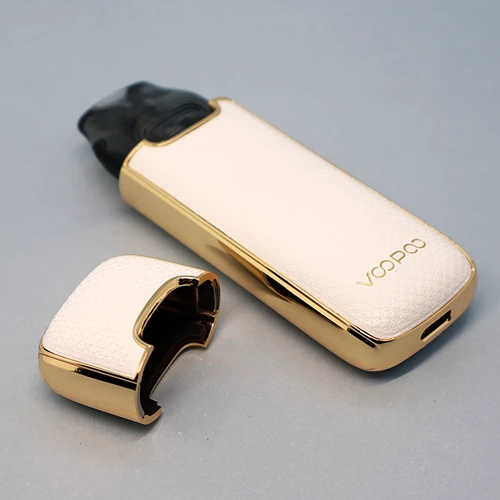
After having used the VMATE i2 not too long ago, the performance of the 0.7Ω and 0.4Ω VMATE Top Fill Cartridges is still fresh in my mind. If you’re currently an owner of the VMATE i2 and have used these pods then you won’t find any surprises with the performance of the VMATE E2.
The 0.7Ω pod is the pod to use for all of you MTL vapers out there. The airflow can be adjusted for a loose MTL draw or a tight MTL draw so a full range of MTL airflow is possible. You can also get a RDL draw if you leave your lips loose around the pod with the airflow wide open but the RDL experience is better with the other pod. Flavor from the pod is excellent. Due to the relatively high resistance of this pod, all sorts of strengths of nicotine salt ejuices can be used.
The 0.4Ω pod is best used with freebase nicotine ejuices for the best experience. It excels for RDL vaping but it can also be used for MTL. Flavor is just as good as the other pod and still delivers a satisfying draw with ample warmth and vapor. I can blow some pretty big clouds with this pod too! While I don’t think I’ll be winning any competitions any time soon, the clouds are decent.
To speak on VOOPOO’s claims with these 3X Upgraded cartridges, they’re holding up just fine so far. The flavor is consistent and rich, so that’s a check. They’ve also been incredibly leak-resistant and haven’t leaked even a single drop of ejuice so far. Lastly, I’ve refilled each pod 5 or six times (lost exact count, sorry!) and there hasn’t been a change in the performance so far. While that’s still a far-cry from the advertised 90ml lifespan, it’s promising at least.
Verdict
The VMATE E2 brings upgrades to the VMATE E in all of the right ways. The design has been greatly improved to feel even more luxurious and premium. I really like the new magnetic dust cap because it helps keep things sanitary and fluff-free. The larger battery, fast charging, and increased 30W maximum output are all welcome upgrades too.
After reading this review, you might be wondering what the difference is between the VMATE i2 and the VMATE E2. Put simply, not a lot. The VMATE E2 is a more premium device with better materials, a battery life display, and 2A charging.
The VMATE i2 is thinner and more pocket-friendly. All of the other specs are the same, as is the performance, so which one you get really depends on if you value the battery life indicator and quicker charging, or if you want a slightly more portable device. If it were up to me, I would go with the VMATE E2 but you can’t go wrong with either.
SAVE 12%
CODE: VERSED







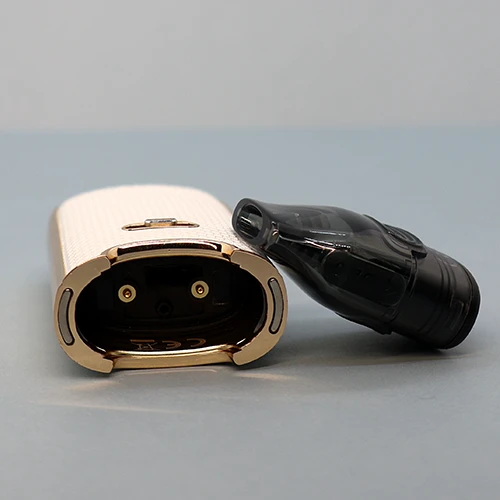









Add comment